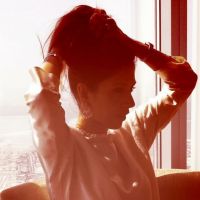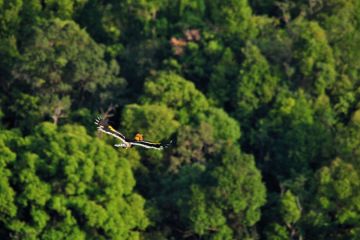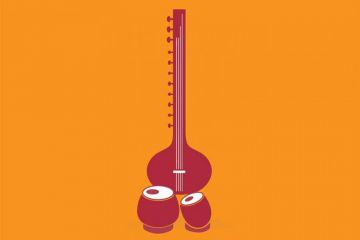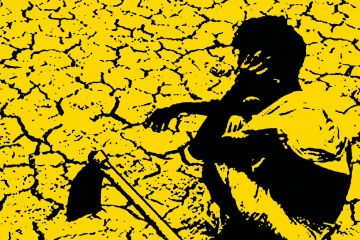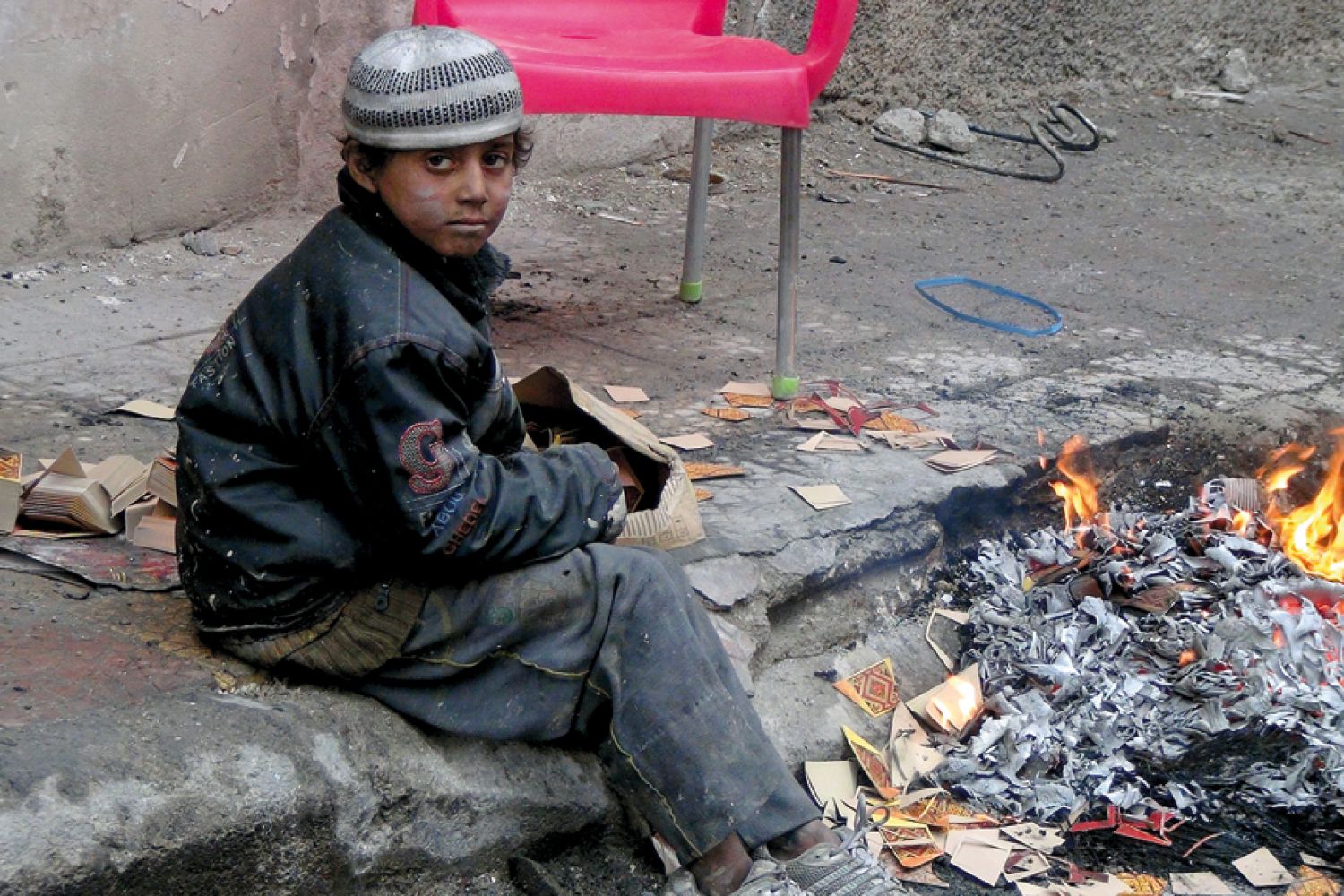
In these hashtag times, #LetUsThrough trended on Twitter. On March 19, a young man with #LetUsThrough written in red
lipstick on his cheek held up a piece of pita bread in solidarity with the
people of the Yarmouk refugee camp in Damascus. He was part of a flash mob that
had gathered in New York’s Times Square, one of the most photographed places on
earth, to express solidarity with the Palestinians of Yarmouk. He faced one of
the seven screens in Times Square that broadcast just one image.
The image is a sea of faces that doesn’t end. The queues for food are as wide as the road. The sheer number of people resembles the crowds that gathered in London for the Queen’s Jubilee. Only in this Damascene suburb, the people aren’t united in celebration but in collective hunger. Men stand on buildings with the façades obliterated by war; women hang off rubble, clutching at exposed pipes. Further back, a man stands on what was once the second floor of a building. A lady in a pink scarf looks gaunt, cheekbones protruding. The trunk of a tree cuts across the picture. There are no branches, no leaves.
The camp lies on a fault line of the Syrian Civil War. As a Damascene suburb, it is strategically important to the government of Bashar al-Assad which battles a three-year-old uprising.
It is always winter in Yarmouk.
On March 2, Christopher Gunness, the United Nations Relief and Works Agency (UNRWA) spokesperson, tweeted: “Tell me I am not alone at being outraged by this scene in the capital city of a UN member state in the 21st century.”
He’s not. Personalities like Hugh Grant, Emma Thompson and Sting lend their celebrity status to Gunness’s social media campaign.
Collectively they demand aid be allowed through.
S
ixteen months ago, rebels infiltrated Yarmouk. The camp lies on a fault line of the Syrian Civil War. As a Damascene suburb, it is strategically important to the government of Bashar al-Assad which battles a three-year-old uprising. Assad’s government responded by setting up checkpoints around the camp, preventing the movement of people and goods in and out, placing it under siege.
This refugee camp was once the heart of the Palestinian community. An UNRWA worker tells me, “Yarmouk was always bustling, it never slept.” Today it lives out its nightmare. UNRWA ran a food distribution program but since December 2012, entry had been sporadic because of the fighting, rendering the vulnerable insecure.
Under Hafez al-Assad and Bashar al-Assad, Arab nationalism was more than just a reflection of identity as it guided foreign policy. This was seen through Syria’s treatment of the Palestine issue where peace with Israel was unthinkable. The people of Yarmouk were thus a part of the social fabric of Damascus and the “Syrian leadership welcomed the Palestinians with their hearts and souls”. Life thrived in Yarmouk, with schools, shops and salons, where most Palestinians I had spoken with said they “felt at home”.
It is estimated that some 2,00,000 people are under siege in government-controlled areas and 45,000 in opposition-controlled areas.
Thus when rebels moved upon Yarmouk, a majority of the civilians pressed for neutrality. But eventually, al-Qaida-affiliated rebels ceased control over the camp. Yarmouk has since been one of the hardest hit areas in Damascus.
***
W
hen the food ran out, Noor ate grass. Clinics were shuttered and so Noor delivered baby Khaled at home. Those were desperate times: her four-month-old niece died of starvation and her neighbour died in childbirth. Eventually, the grass ran out too so Noor boiled spices in water and drank that.
When Khaled was two months old, Noor stopped lactating. At 18 months, he weighed as much as a healthy five-month-old and suffered from kwashiorkor, a severe form of malnutrition caused by a lack of protein. For four weeks UNRWA doctor Ibrahim Mohammad looked after him and slowly, his weight increased.
“His story is reassuring,” says Gunness, “that a small injection can save lives.”
Getting the aid through isn’t easy. On good days, a white pickup truck with brown boxes containing rice, lentils, sugar and other essential commodities will enter Yarmouk refugee camp. On those days, it will park next to a wall ridden with bullets and aid workers will anticipate that the ceasefire holds. On the bad days, food is being used as a weapon of war, the tactic being besieging civilians to get an upper hand in the civil war.
It is estimated that some 2,00,000 people are under siege in government-controlled areas and 45,000 in opposition-controlled areas. Stern words from the soft-spoken, gentle secretary-general of the United Nations are rare, so when Ban Ki-moon speaks out about the “chilling darkness” and about being “profoundly shocked”, something must be terribly amiss.
On February 22—in a rare display of unanimity amongst Russia, US, China, France and UK—resolution 2139 was put into effect, that laid the groundwork to ease restrictions to aid and provide relief. UN Human Rights Commissioner Navi Pillay warned that the obstruction of aid convoys headed to Yarmouk could constitute a war crime.
***
S
eventeen minutes. 12.7 kilometres. That’s the distance between Yarmouk and Mezzeh, and a little further for the Presidential Palace where the President and his coterie live in an alternate universe. While some eat grass, others dine on buffets. So when Damascus readies to hold elections, one wonders: has the leadership really lost its marbles? International observers call the election a “sham”. While Lakhdar Brahimi, the UN envoy for Syria, hands in his papers because peace is too elusive a goal, Assad’s minions plaster his face on billboards across the country.
In 2012, as the insurrection against Assad gained momentum and calls for reform got louder, the Ba’athist government reported that 89.4 per cent of voters backed a new constitution in a referendum. The constitution stipulates elections be held in 2014. It also mandates that people standing for political office must have lived in Syria for at least 10 years. This rule makes it impossible for the Western-backed Syrian National Coalition candidates to stand. So while Bashar al-Assad faces his first multi-candidate election, the two he faces off to are relative unknowns. Maher Hajjar is an independent MP and member of the Communist party, and Hassan al-Nouri is a Damascene businessman from the domestic opposition.
In his new posters, Assad wears a grey suit and blue shirt, his hair a neat crew cut and his blue eyes looking away from the camera. “Sawa”, it reads in green. Together.
Below it is his signature and in the corner his Facebook and Twitter campaign. He looks calm, his eyes disconnected from reality. He doesn’t smile. He smirks.
“H
e wasn’t like this before,” he says. Bashar al-Assad used to laugh, he smiled in pictures. “He was always restrained. He thought his teeth were too small,” Ayman Abdel Nour tells me. Bashar and Ayman attended Damascus University together; one studied medicine and the other engineering. Back then, Bashar had no interest in political life, he enjoyed the privileges afforded to a civilian. His brother, Bassel, was the heir apparent, groomed for the top job from a young age while Bashar enjoyed the reckless abandon of the beach. He was a great fan of basketball, far more interested in the game than in power play, and a computer geek.
Then in 1994, Bassel died in a car crash and that’s when Bashar was made to step out in the public sphere. He had to give up his life as an ophthalmologist in London and he found settling into political life hard, recalls Ayman. He was soft-spoken, hesitant. He used to listen rather than ask questions, but he was being groomed.
“Bashar underwent a complete personality change after his return,” says Ayman. First, he was sent to the army by his father and was then taken under the wing of the Ba’ath Party’s old guard. Mohammed Kheirbek, a fellow Alawite, passed on all the secret accords that Hafez al-Assad—Bashar’s father and Syria’s president for nearly 30 years—had signed. The head of Syria’s civil intelligence service, Bahjat Suleiman, took him on a tour of Syria and taught him about the internal security situation. Bashar’s manner changed too: he was stern and had more questions. “He wanted to know everything,” Ayman tells me over coffee. He even stopped laughing out loud and his eyes became aggressive.
Bashar, with his English wife and soft manner, had injected a dose of freshness into Syria. The Damascene elite would party hop. But there was one unwritten rule: never criticise the government.
Six years after his apprenticeship, in 2000, his father died. Bashar, who had previously never held a political post, was thrust into the seat of president at the age of 34. In his early days as president, Bashar remained open to the idea of reform. “Reformers would bring papers to him and for the first few months, he was signing without even reading,” says Ayman. Damascus experienced a period of openness known as Damascus Spring till 2001.
Then something changed. He got paranoid and his circle got smaller. “He bought into the cult of his own personality.” In an interview to The Washington Post in 2000, Bashar is quoted saying, “As a point of principle, I would like everybody to be able to see everything. The more you see, the more you improve but others have reservations."
***
“B
roken promises,” was how she explained the presidency of Bashar al-Assad. It was spring in 2012, and she was in Amman to lend support to the opposition that was regrouping in the capital of Jordan. Initially, she, a prominent writer in Syria, had lent support to Bashar, the reformer. When the Damascus Spring of 2001 had brought mobile phones to a country, crowds had gathered in the capital chanting “God, Syria, Bashar.”
Bashar, with his English wife and soft manner, had injected a dose of freshness into Syria. New publishers had sprung up and art galleries were thriving. The Damascene elite would party hop, drinking champagne at a gallery opening, smoking shisha late into the night. “Those were the golden days,” she reminisced. It was a period of nostalgia: old Roman ruins and Ottoman era mini-palaces were lit majestically as Syria drew upon its rich history, as a secular country with the tombs of both martyr Hussein and John the Baptist. Old squabbles such as the long-standing hostility between Syria and Turkey were making way for smooth relations and a thaw between Lebanon and Syria soon followed.
“But we were never truly free. I was never able to write as I pleased. There was one unwritten rule: never criticise the government,” she told me.
For long, the Arab Spring in Syria has been linked to the fateful day when a group of students scribbled anti-government graffiti that had emerged during Tunisia’s revolution. In red letters, a school wall in Dera’a read: “The People Want the Fall of the Regime”. That was March 12, 2011. She tells me that in Syria, the revolution had arrived much earlier when she, along with a group of other people, had staged a solidarity protest with the people of Egypt on February 5. “It was like a dream,” she says. Emotions ran high and someone in the crowd chanted: “God, Syria, freedom—that’s enough.” Many others joined in.
The challenge to Bashar’s government had begun.
The notorious Syrian secret police, the shabiha, warned the crowd—“You know what we can do if you don’t leave”—but the time for listening was over. They met again in old town Damascus at the Umayyad Mosque to protest a police beating. A few people filmed the protest until they were attacked by the secret police and all traces of the protest wiped out. A group met once again on February 22 outside the Libyan Embassy and was met with rubber bullets and tear gas. “I screamed for them to stop. I told them we are brothers and sisters,” she recalled. No one listened.
She lost friends in the uprising, including exiled Syrian filmmaker Tamer al-Awam who was killed while filming the bombardment of civilian neighbourhoods in Aleppo. “He should have stayed in Germany,” she says. This is what the government wants. They want to drive everyone with a voice out of the country. They only want sheep in this country.
They continued to meet but their protests had moved underground. They gathered in houses in Damascene suburbs with their hair and faces covered. They discussed plans to strengthen the rebellions in Dera’a and Homs. Often she would walk to rebel enclaves past government checkpoints with money stuffed in her bra. She’d pass that on to the rebels to buy food and weapons. Then people started disappearing. The economy was floundering. She was out of job, so she fled to Dubai where she continued to raise money for the revolution. She feels like a traitor, she says, but she’ll keep sending money until Damascus is liberated.
The cash won’t tilt the balance, I say. It will just buy more time.
“Even if we don’t win, we will keep punishing Bashar,” she says, from the security of exile.
At what human cost, I ask.
She just waves me off.
***
A
s buses full of rebels vacated Homs, I was reminded of a conversation I had with a middle-aged woman outside Homs’ hospital a couple of years ago. “These are not our boys,” she had told me. Her husband had stopped going to the mosque near their house. There were men with long beards and short kandooras who had set up home in the mosque. They were telling the Syrian youth to join the fight for Islam and their freedom.
“This demon will eat our country,” she had said. Eventually she left Homs with her husband and two sons.
Almost two years have passed since that day. After trying to contact her for the past week, I finally get through. Her phone battery has died and there’s nowhere to charge the phone, she explains. I ask her what it feels like to return home. She laughs, or perhaps she cries. “The house where I lived, where I raised my three children, is no longer my house. It is just slabs of concrete, impersonal, unrecognisable. We have nothing left. They have stolen my life,” she said.
For some time now, we have known that Syria has been a proxy battleground for a much bigger conflict. It has seen the regional rivalry between Sunni Saudi Arabia and Shi’a Iran play out alongside an extension of the Cold War between Russia and the US. The conflict has pitted al-Qaida fundamentalists against the Lebanese Hezbollah. Syria also sees foreign fighters—from France, China, India and England—battle in the name of jihad.
This is what director Wiam Bedixran saw during the siege of Homs: dead children and maimed animals, streets flowing with blood, emaciated teenagers in his documentary Silvered Water, Syria Self-Portrait.
Anti-government protests erupted after Dera’a’s “Days of Rage” and soon local Homsi were taking part in anti-government protests. Initial protests with tents and songs of sedition were soon replaced by fierce street battles. Soon Baba Amr became a symbol of resistance and earned Homs the reputation of “capital” of the revolution. The government undertook an operation in February 2012 that left hundreds dead, yet the opposition maintained control. It was only last month that the government imposed siege, where about 3,000 civilians were trapped without food and medical supplies, living under intense shelling.
In my travels since the start of the uprising, from Homs to Damascus, Istanbul to Amman, Hatay to Za’atari, I have heard rebels complain about the inadequacies of their financiers. Their long-standing demand for anti-tank missiles is met by token aid. After three years of war, the Saudis, with American backing, have provided a small number of vetted moderate groups with anti-tank missiles. Many of the rebel commanders I spoke to before claim that this will not shift the balance; it will merely prolong the conflict. Both sides, rebel and government, are slowly edging to the conclusion that neither side can score an outright victory.
Recent developments in Homs have been celebrated as a victory for the government as it slowly reclaims territory. It has been lamented as a loss by the rebels but in this narrative, the people of Homs, and Homs itself, are forgotten.
This is what director Wiam Bedixran saw during the siege of Homs: dead children and maimed animals, streets flowing with blood, emaciated teenagers. Bedixran, a brave Kurd, smuggled a camera into Syria and lived to tell the story of the siege in Silvered Water, Syria Self-Portrait, a documentary on the atrocities committed under the siege.
On May 16, as Cannes was transformed into an odyssey of cinema and fashion, Bedixran sobbed in a small screening room and bowed as she received a standing ovation.
As we slowly start to put together the stories from Homs and Yarmouk, I can’t help but wonder about the 2,50,000 others deprived of food, devoid of rights.

